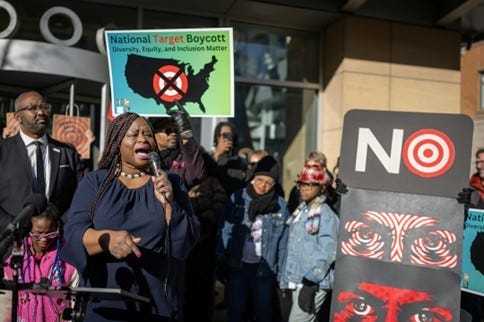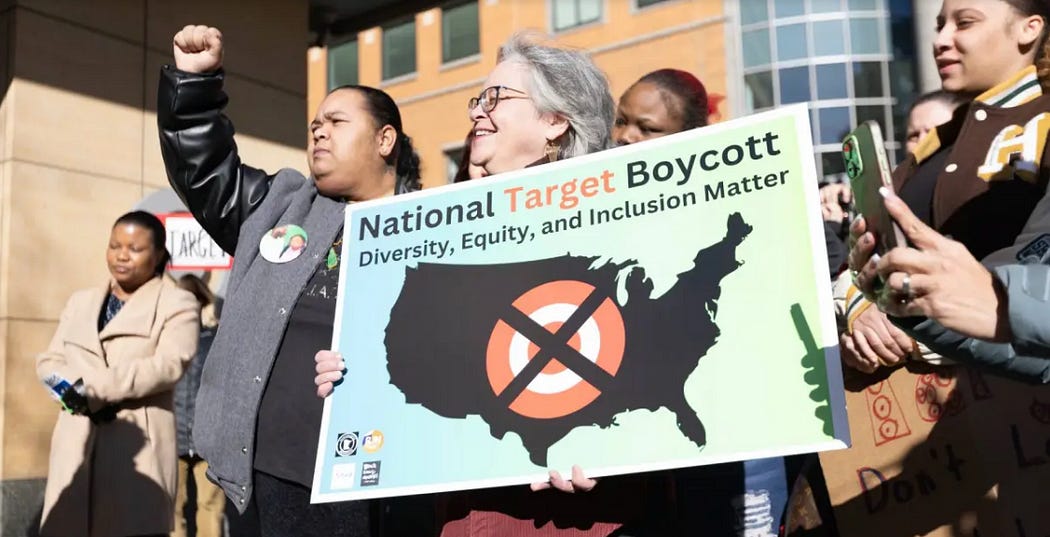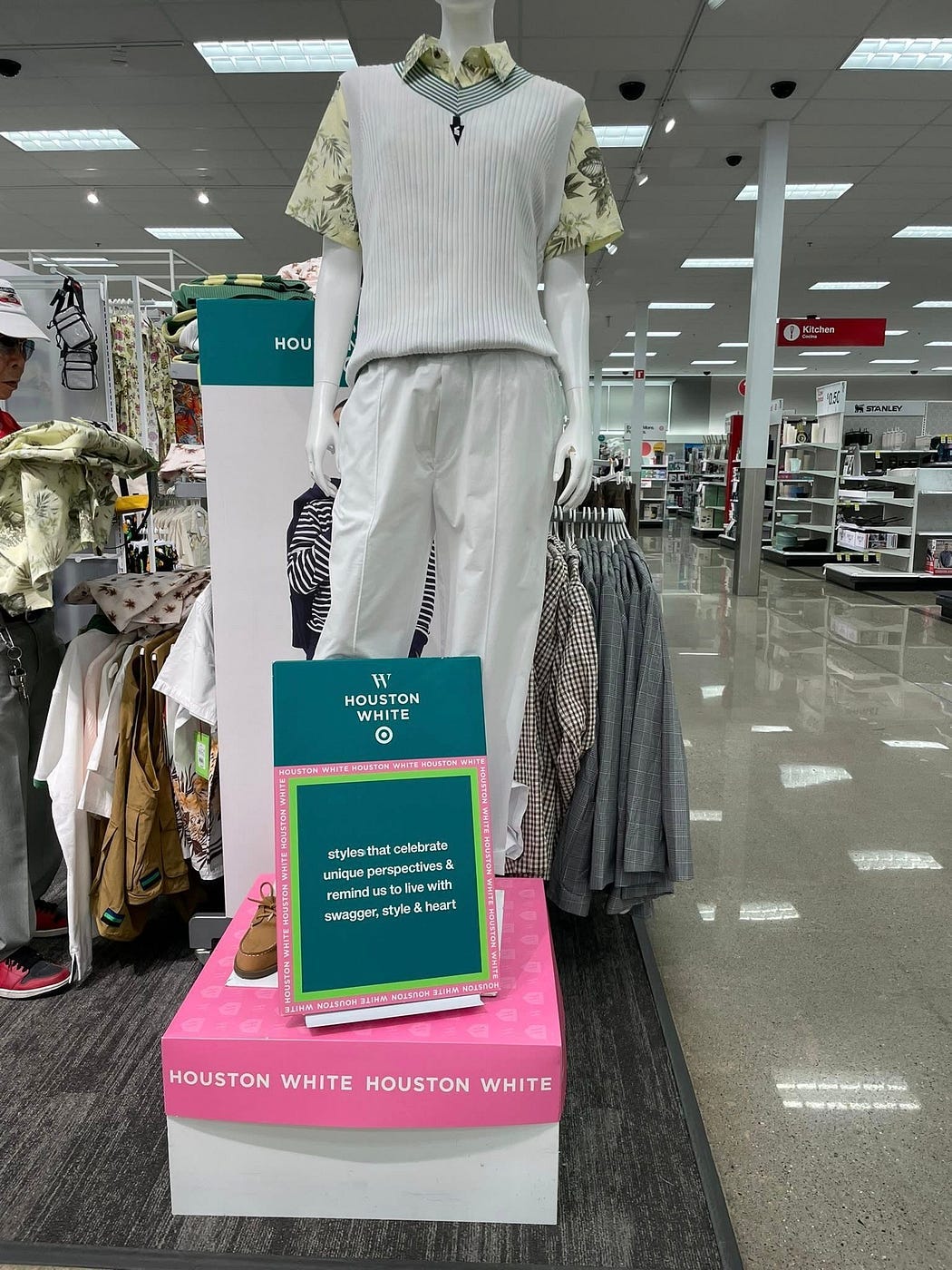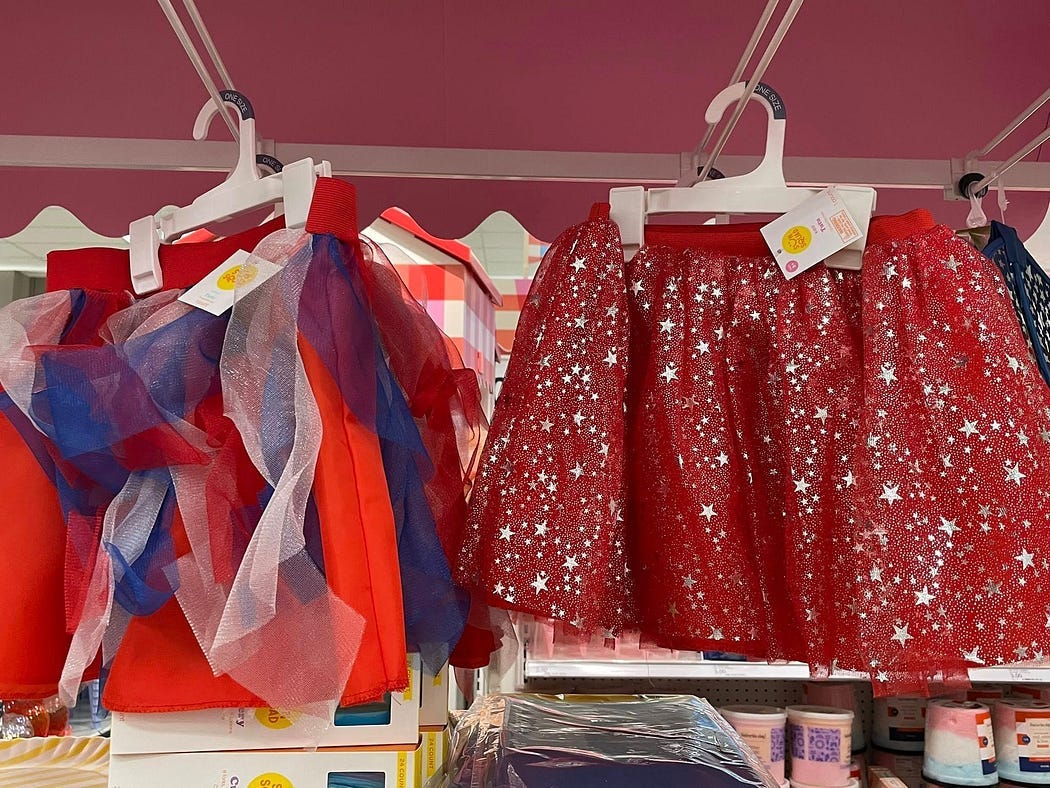The Haters are Winning at Target
A local’s reflection on the retailer’s reversal on diversity, equity, and inclusion five years after George Floyd’s killing.
This article was first published in An Injustice! June 25, 2025
Five years ago, My Target was one of the first businesses hit by the civil unrest after the police murder of George Floyd in South Minneapolis. I call it “My” Target because it is within a good morning’s walk from my home, because I pass it at least a dozen times a week, and because I stopped in at least once a week to use my Red Card for whatever caught my eye.
It is also across the street from the Minneapolis Police Department’s Third Precinct, where Derek Chauvin, the officer who knelt on Floyd’s neck for over nine minutes, was based. And ground zero for protests in response.
“My” Target was the first one built in an urban area. It was part of a 1970s-era revitalization project on property that had, for the previous 100 years, housed a machine factory that provided good-paying jobs to the area’s working-class families. When the factory closed, the city purchased the property and demolished the factory buildings. Target opened its doors to the neighborhood in 1979.
Something about it was kinda cool, especially in comparison to Walmart, its main competitor. We were always willing to pay a little bit more for that “Tar-zhay” vibe. Before the first Target opened in Manhattan, a friend of mine visiting from there wanted to shop at one while she was here. Of course, I brought her to “My” Target.
They were also a good corporate partner with the community. Its name adorns both the professional baseball stadium and the professional basketball arena. They were a staple in the annual Pride parade for nearly two decades. And a trailblazing partner with local nonprofits and underserved communities, giving away $333 million in fiscal year 2023 alone between its stores and corporate foundation.
The looting of the store was just one of the heartbreaking losses wrought on our community that last week of May 2020, the first of which was the death of Floyd just two days earlier.
The looting of the store was just one of the heartbreaking losses wrought on our community that last week of May 2020, the first of which was the death of Floyd just two days earlier.
I was proud of our hometown store when just the next week, Brian Cornell, Target’s chairman and CEO announced a $10 million initial commitment to advance social justice and support rebuilding and recovery efforts in local communities hit by the civil unrest. “Target stands with Black families, communities and team members,” Cornell said at the time. “As we face an inflection point in Minneapolis and across the country, we’re listening to our team, guests and communities, committed to using our size, scale and resources to help heal and create lasting change.”
Over the next few months, Target announced additional financial and programmatic commitments to racial justice, from doing more to advance racial equity to increasing representation of Black employees across its workforce by 20% over the next year to creating a Black entrepreneurs supply pipeline and spending more than $2 billion with Black-owned businesses by 2025.
By early November, the store was reopened, with changes designed through conversations with the community. New products were added, and the store layout was improved, including an additional entrance closer to public transit. A team member wrote a poem based on the community’s feedback, reflecting the commitment to community and resilience. Over the next couple of years, they worked with local artists to design and paint murals on the building’s exterior that amplify these messages.
Later, in April of 2021, Cornell talked about the impact of Floyd’s murder on him. “That could have been one of my Target team members,” he said at an Economic Club of Chicago event. “It’s time to take it to another level, and that as CEOs, we have to be the company’s head of diversity and inclusion,” he said to his fellow corporate leaders. “We have to be the role models that drive change and our voice is important. And we’ve got to make sure that we represent our company principles, our values, our company purpose on the issues that are important to our teams.”
My, how things have changed
Five years later, as many in my community reflected on what has happened since that fateful week in 2020, Target has said nothing. Outside the Target C-suite, church leaders called for nationwide protests at Target stores on the anniversary of Floyd’s death to continue the boycott of the retailer, while conservative activists praised it for pushing back on “the radical neo-racist Marxist mob” and “returning to sanity”.
What happened?
As the nation’s conservative culture warriors grew more virulent and bold over recent years, Target got in the crosshairs of members of the MAGA movement and the conservative activist ecosystem.
As the nation’s conservative culture warriors grew more virulent and bold over recent years, Target got in the crosshairs of members of the MAGA movement and the conservative activist ecosystem.
The first attacks were on Target’s actions to welcome LGBTQ people in their stores. In 2016, it set a policy saying that transgender guests could use the bathroom of their choice. The pushback caused them to reverse their stance soon after. A few years later, in 2023, Target was back in the headlines when its Pride merchandise caused outrage largely driven by organized conservative and far‑right anti‑LGBTQ forces. It was fueled by social media influencers and included videos of people confronting Target employees, knocking over Pride displays, and posting threatening social media videos inside Target stores, according to the Wall Street Journal. By the next year, Target didn’t even stock Pride items in half of its stores, and in the stores that did have Pride merchandise, the displays were moved away from the main entrance further into the interior of the store.
2024 was also the first year that Target was targeted by the National Center for Public Policy Research, a self-described conservative think tank that is part of the right-wing’s effort to push back on human rights. In April of that year, NCPPR submitted a shareholder resolution “request[ing] a report examining the risks to the financial sustainability and reputation of the Company arising from its partnerships with, charitable contributions to, and other support for divisive social and political organizations and causes.” They specifically called out Target’s partnership with the Human Rights Campaign’s Corporate Equality Index, which NCPPR calls “overtly partisan and divisive activism”, accusing Target of “aggressively tout[ing] radical gender theory in its stores.”
Target’s shareholders rejected the resolution at its June 2024 annual meeting with 95.6% voting against it. But NCPPR did not give up.
Target’s shareholders rejected the resolution at its June 2024 annual meeting with 95.6% voting against it. But NCPPR did not give up.
Trump enters the chat
Then Donald Trump got back into the White House. On his first full day in office in January, he wielded his pen on Executive Order Number 14151, titled “Ending Illegal Discrimination and Restoring Merit-Based Opportunity”. Among other things, the EO calls for no “DEI” in the private sector, citing Students for Fair Admissions, Inc. v. President and Fellows of Harvard College, the U.S. Supreme Court ruling that deemed affirmative action in college admissions unconstitutional. It explicitly directs each federal agency to identify up to nine potential private sector entities that the new administration can investigate for potential litigation for their racial justice activities.
It didn’t take long for Target to react. By the end of that same week, it announced in a memo to staff a full reversal of the commitments they made in the wake of George Floyd’s death and the racial reckoning that followed. This included its three-year diversity, equity, and inclusion goals, its partnership with the Human Rights Campaign’s Corporate Equality Index, and its programs focused on offering more products from Black- or minority-owned businesses. The memo cited “the importance of staying in step with the evolving external landscape” as part of their decision.
A community responds
The reaction was immediate. Letters to the editor of the local paper testified to the betrayal shoppers felt, especially because Target’s response to George Floyd’s killing was so admirable. Writers stated their commitments to shop elsewhere until Target reversed its decision.
Twin Cities Pride immediately disinvited Target from this year’s Pride festivities. “In a time where it’s been a really, really rough week for our community given everything that has come down from the new administration, this was kind of the straw that broke the camel’s back,” the director of TC Pride said. (A funding surge has since made up for the loss of Target’s annual donation.)
The next week, three prominent civil rights leaders in Minneapolis rallied outside of Target’s headquarters calling for a boycott in response to their pullback. We “were stunned,” said Nekima Levy Armstrong, a civil rights attorney, activist, and founder of the Racial Justice Network. “We thought they would hold the line.”

Yohuru Williams, a University of St. Thomas history professor and director of the school’s Racial Justice Initiative who has worked with the retailer on their DEI efforts called Target’s retreat a “betrayal to so many in terms of what’s happening now.”
It’s been rough on Target’s bottom line, too. In mid-June, Fortune magazine reported that “Target’s foot traffic fell for the fourth month in a row — and it’s ‘going to continue to snowball,’ reputation analytics firm says.” Earnings for the first quarter ended March 31 for comparable-store sales were down by 5.7% from a year earlier. CEO Cornell implied the decline was in part due to the backlash to the “updates we shared…in January”.
Target’s earnings for the first quarter ended March 31 for comparable-store sales were down by 5.7% from a year earlier.
Not everyone is disappointed in Target’s DEI reversal though. “MommySue” commented on the news: “Good decision. We all need to be measured on our merits first!”; “3rdPartyCon”: “I’m more likely to shop at target (sic) now than yesterday,” and “Thoughts” added: “Good, it was a discriminatory program; two wrongs do not make a right.”
And it seems to have mollified at least some from the conservative legal movement. For the second year in a row, the above-mentioned National Center on Public Policy Research filed a shareholder resolution at Target’s annual shareholder meeting in June. This one called for Target to prepare a report “on how affirmative action initiatives impact Target’s risks related to actual and perceived discrimination”, arguing that its “affirmative action” programs “may be deemed immoral, illegal, and a breach of duty”, thus opening it up for legal risk from staff who may sue for discrimination.
At the meeting, David Almasi, NCPPR’s Chief Operating Officer and Vice President, actually encouraged a no vote on their own resolution because “a lot has changed since we submitted the proposal.” Target started to do it right, Almasi argued, and should be commended for pushing back on “the radical neo-racist Marxist mob…and bringing us back to sanity.” It almost made me want to vote for it, just because he was against it.
TL/DR, just like in 2024, NCPPR’s proposed shareholder resolution was defeated.
“My” Target is gone
The haters seem to be winning at Target, to the retailer’s detriment.
I visited “My” Target around the anniversary of its looting at the beginning of June. Even though it was a weekend afternoon, it was easy to get a good parking spot. The cashier lines were also shorter, reflecting the statistics about the decline in shoppers since the before times.
Also, in the before times there had been prominent displays of merchandise from Black suppliers. On this visit, I saw only one — a very understated display of a local Black supplier: the great Houston White.
Despite it being June, I didn’t see any Pride display — or even items — anywhere in the store. Instead, there were quite a number of July 4th Americana items on prominent display — despite the July 4th holiday being over a month away. (The Street reports similar observations from X and Reddit users.)
Another sign of Target’s diminishing returns was the number of grocery items on clearance — deeply discounted because they were past their best-buy date. It appeared that Target had overordered, not expecting the drop in customers that it experienced.
All of this was happening under the mural with the poem written by the Target team member inspired by the community’s pain in the summer of 2020:
We will root our stories deeply.
As seeds of courage and change.
We will keep each other grounded.
With hope, resilience and strength.
There is healing here to grow from.
Our renewal to stand as one.
Community means everything.
Together is where we belong.
It felt surreal. And sad.
Obviously, I’m not privy to the deliberations that the Target CEO and his leadership team are making regarding the attacks from the conservative activists and lawyers. But I do know that alternative options were available. Costco, Apple, and even John Deere are just a few examples of companies that have stood up to Trump’s and the conservative movement’s attempts to remove programs that uplift all segments of society.
The community would have rallied around you. Just like we did after the summer of 2020.











Excellent summary and helpful! Wow!